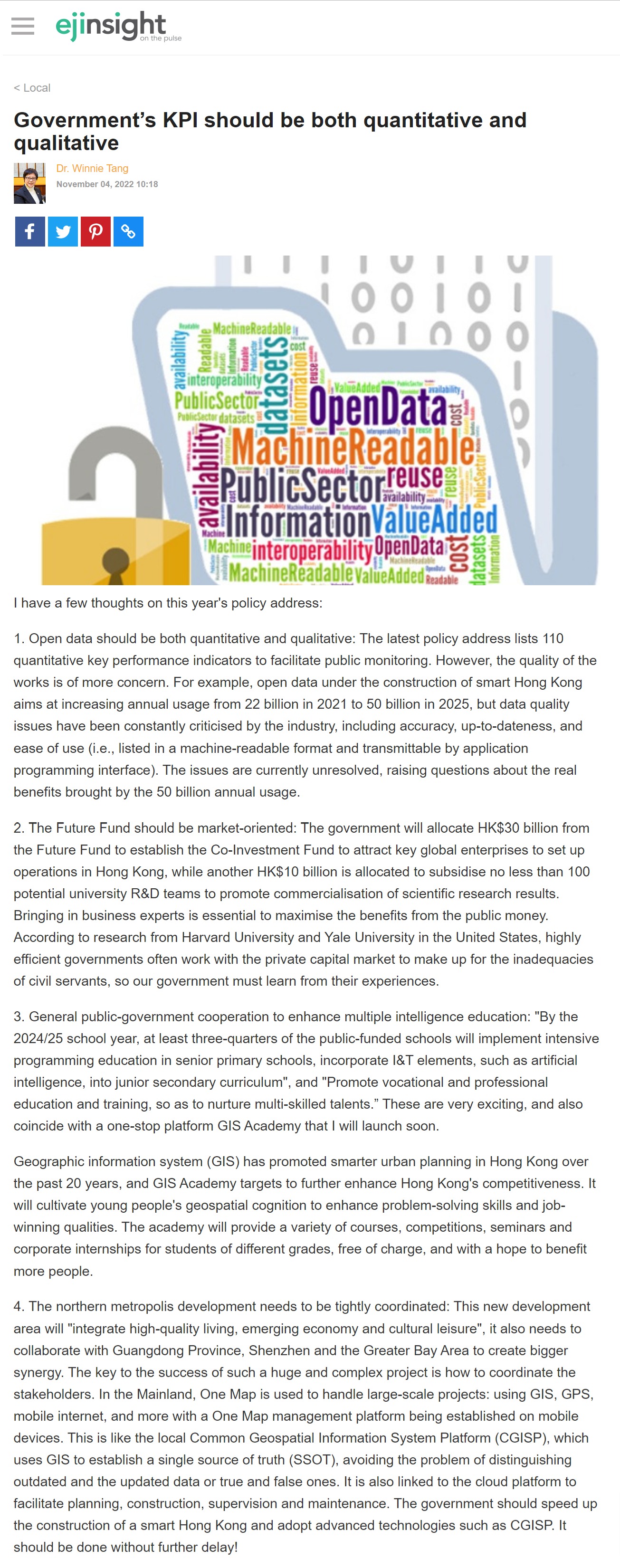網上版請按此

Government's KPI should be both quantitative and qualitative
I have a few thoughts on this year's policy address:
1. Open data should be both quantitative and qualitative: The latest policy address lists 110 quantitative key performance indicators to facilitate public monitoring. However, the quality of the works is of more concern. For example, open data under the construction of smart Hong Kong aims at increasing annual usage from 22 billion in 2021 to 50 billion in 2025, but data quality issues have been constantly criticised by the industry, including accuracy, up-to-dateness, and ease of use (i.e., listed in a machine-readable format and transmittable by application programming interface). The issues are currently unresolved, raising questions about the real benefits brought by the 50 billion annual usage.
2. The Future Fund should be market-oriented: The government will allocate HK$30 billion from the Future Fund to establish the Co-Investment Fund to attract key global enterprises to set up operations in Hong Kong, while another HK$10 billion is allocated to subsidise no less than 100 potential university R&D teams to promote commercialisation of scientific research results. Bringing in business experts is essential to maximise the benefits from the public money. According to research from Harvard University and Yale University in the United States, highly efficient governments often work with the private capital market to make up for the inadequacies of civil servants, so our government must learn from their experiences.
3. General public-government cooperation to enhance multiple intelligence education: "By the 2024/25 school year, at least three-quarters of the public-funded schools will implement intensive programming education in senior primary schools, incorporate I&T elements, such as artificial intelligence, into junior secondary curriculum", and "Promote vocational and professional education and training, so as to nurture multi-skilled talents." These are very exciting, and also coincide with a one-stop platform GIS Academy that I will launch soon.
Geographic information system (GIS) has promoted smarter urban planning in Hong Kong over the past 20 years, and GIS Academy targets to further enhance Hong Kong's competitiveness. It will cultivate young people's geospatial cognition to enhance problem-solving skills and job-winning qualities. The academy will provide a variety of courses, competitions, seminars and corporate internships for students of different grades, free of charge, and with a hope to benefit more people.
4. The northern metropolis development needs to be tightly coordinated: This new development area will "integrate high-quality living, emerging economy and cultural leisure", it also needs to collaborate with Guangdong Province, Shenzhen and the Greater Bay Area to create bigger synergy. The key to the success of such a huge and complex project is how to coordinate the stakeholders. In the Mainland, One Map is used to handle large-scale projects: using GIS, GPS, mobile internet, and more with a One Map management platform being established on mobile devices. This is like the local Common Geospatial Information System Platform (CGISP), which uses GIS to establish a single source of truth (SSOT), avoiding the problem of distinguishing outdated and the updated data or true and false ones. It is also linked to the cloud platform to facilitate planning, construction, supervision and maintenance. The government should speed up the construction of a smart Hong Kong and adopt advanced technologies such as CGISP. It should be done without further delay!
Dr. Winnie Tang
Adjunct Professor, Department of Computer Science, Faculty of Engineering; Department of Geography, Faculty of Social Sciences; and Faculty of Architecture, The University of Hong Kong